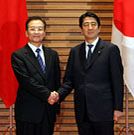Chinese Premier Wen Jiabao's April 11-13 visit to Japan helped advance the modest détente that has marked Sino-Japanese relations since Shinzo Abe became Japanese Prime Minister in September 2006. Abe has made improving ties between China and Japan -- which had deteriorated sharply -- a priority. Despite some achievements, however, the summit failed to resolve the underlying economic and especially security tensions between the two countries. Wen's sojourn represented the first visit by a senior Chinese leader to Japan in seven years. He described his trip as an effort to "melt the ice" that had characterized Sino-Japanese relations in recent years under Abe's predecessor, Junichiro Koizumi. Until Abe's October 2006 visit to Beijing, the Chinese government had frozen high-level summits with Japanese leaders outside the context of multilateral gatherings in order to protest Koizumi's annual visits to the Yasukuni Shrine. In his speech to the Japanese parliament, Wen intimated that Abe should continue to refrain from visiting the shrine, which the Chinese view as a symbol of Japanese militarism, to avoid giving the impression that Japanese apologies for wartime atrocities were insincere. Despite the high-profile cultural and business exchanges that characterized the visit, Wen's warning underscored the underlying tensions that still trouble the relationship between the two governments. For example, Wen and Abe failed to achieve discernible progress on the Sino-Japanese dispute over the energy resources under the East China Sea dispute. Even as Wen visited Tokyo, Japanese officials expressed concern about a report that China's state-controlled CNOOC Ltd. had begun processing oil and natural gas from the Chunxiao/Shirakaba gas fields that are currently disputed by the two countries. At the summit, the two governments agreed only to continue bilateral discussions and to review a report on how their countries could jointly develop the undersea natural resources. Their present energy cooperation focuses mostly on joint conservation and environmental measures.
Sino-Japanese Relations Remain Problematic Despite Recent Summit

